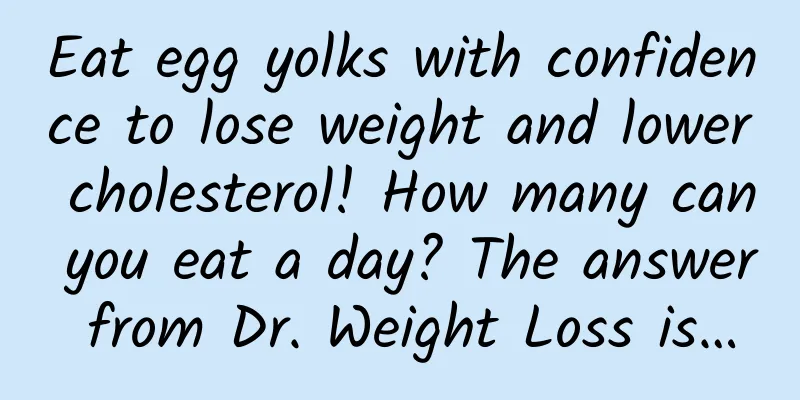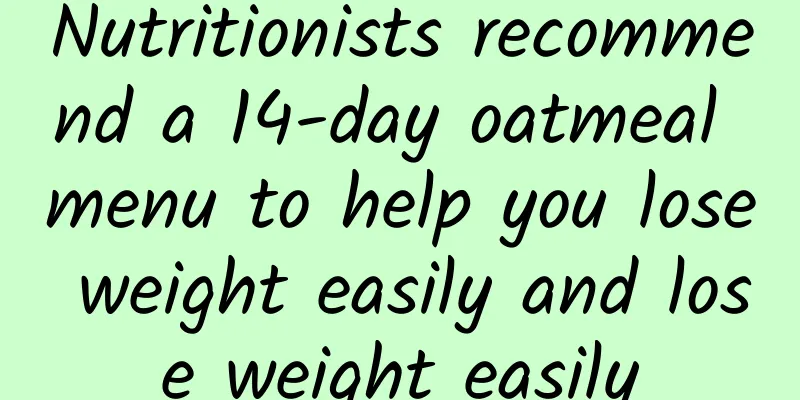Eat egg yolks with confidence to lose weight and lower cholesterol! How many can you eat a day? The answer from Dr. Weight Loss is…

|
Many people probably have a concept: the cholesterol content in egg yolks is very high. Eating too much will increase blood lipids, which is of course not conducive to weight loss. Therefore, they are "cautious" about eating eggs and dare not eat them with confidence. However, the egg yolk is not evil. On the contrary, for those who want to lose weight, they can eat eggs (including the yolk) with confidence. Why? Below, experts will unveil the mystery of eggs. One egg yolk a day, no more than that? Xiao Danhua, a doctor of nutrition at Columbia University Medical School, observed that the doctors in the hospital's cardiology department would never eat more than one egg yolk a day. They said: One egg yolk contains 200 mg of cholesterol, and the daily cholesterol intake of people should not exceed 300 mg, so one egg yolk a day is enough; if you eat more, the cholesterol in the body will be too high and will accumulate in the blood vessel walls, inducing cardiovascular disease! Xiao Danhua studied nutrition at a prestigious American university and found that the words of the cardiologists were quite well-founded. They were all written in black and white in the "Dietary Guidelines for Americans" (hereinafter referred to as the "Dietary Guidelines"): "Scientific research over the past few decades has always believed that there is a direct causal relationship between dietary cholesterol and the occurrence of cardiovascular disease. Therefore, the view of the nutrition, medical and scientific communities has long been: To reduce the incidence of cardiovascular disease, it is necessary to limit the intake of cholesterol in the diet!" In his new book, "Take the Fat Off the Road," he said that since 1977, the U.S. Department of Agriculture and the Nutrition Policy Center under the Department of Health have always provided dietary guidance to the public: "Reduce the consumption of eggs, cream and other high-cholesterol foods. Daily cholesterol intake should not exceed 300 mg." This advice was later written into the "Dietary Guidelines", which was issued by the Nutrition Policy Center and updated every five years by a dozen experts after integrating the latest scientific research and the nutritional needs of the public. So, over the years, Xiao Danhua and his patients have always said the same thing: adopt a low-fat diet and eat egg whites every day, but only one egg yolk is enough and throw away the rest! (Although I still feel bad about throwing it away.) ★However, in 2015, cholesterol was vindicated! Including egg yolks of course! In February 2015, the expert committee of the Dietary Guidelines for Americans released a 572-page scientific report, which reads on page 91: "Previously, it was recommended that daily cholesterol intake should not exceed 300 mg. However, in the new 2015 Dietary Guidelines, we will no longer use this because new scientific evidence shows that there is no clear relationship between dietary cholesterol and serum cholesterol, as reported by the American Heart Association and the American Association of Cardiovascular Disease. Whether cholesterol is consumed excessively is no longer a concern." As soon as the report came out, public opinion was in an uproar and major mainstream media in the United States rushed to report it. What’s going on? Have we all been eating wrong things over the past few decades? ★The truth is: Scientific research in the past few years has found that only 15% of the cholesterol in serum comes from the diet, while the remaining 85% is synthesized by the liver. Our body has a powerful feedback regulation system that can adjust its own synthesis according to the amount of cholesterol ingested, thereby ensuring that the cholesterol in the cells is maintained at a relatively stable level. Therefore, dietary cholesterol intake does not have a significant effect on serum cholesterol. On the other hand, is the low-density lipoprotein cholesterol (LDL, commonly known as "bad cholesterol") in the blood really the culprit that deposits in the blood vessel walls and forms atherosclerosis? In fact, only LDL that is small in size, high in density, and oxidized is the real "bad cholesterol". They get stuck in the blood vessel walls, inducing local inflammatory reactions, and after being swallowed by macrophages, they form foam cells that attach to the blood vessel walls, gradually forming plaques that cause the blood vessels to narrow or even block. Smoking aggravates the oxidative stress response in the body and induces the formation of more oxidized LDL; a high-carbohydrate diet can stimulate insulin secretion and accelerate the transformation of macrophages into foam cells; excess glycogen will be converted into triglycerides in the body and promote the formation of more small and dense oxidized LDL. A diet high in polyunsaturated fatty acids can increase the body's high-density lipoprotein cholesterol (HDL). HDL can effectively clean up LDL deposited on the blood vessel walls, playing the role of a "blood vessel scavenger." The Dietary Guidelines have decided to remove the limit on cholesterol in the diet Over the past few decades, due to the restrictions on daily cholesterol intake in the Dietary Guidelines, people have turned to eating more carbohydrates while keeping the total daily diet unchanged; especially the food processing industry, which adds more sugars and high salt to make food "delicious", which in turn has an adverse effect on the human body. The scientific report also pointed out that the use of sugary drinks has reached 19% of the total daily calorie intake of Americans; and various snacks and desserts, although not as nutritious as regular meals, account for 25% of the total daily calories and have become the main source of added sugars and saturated fatty acids. At the same time, the number of overweight and obese people is increasing, reaching two-thirds of the U.S. population. The various diseases that accompany them, including diabetes, cardiovascular disease, cancer, etc., have also become an increasing health risk for these people. Therefore, the decision of the Dietary Guidelines to remove the restrictions on cholesterol in the diet also includes another consideration: it hopes that the public and the food industry will shift their attention from cholesterol to high sugar, and from restricting cholesterol to restricting the use of various added sugars, reducing dependence on sugar, and increasing the intake of polyunsaturated fatty acids (which produce "good cholesterol") to make the diet more balanced. ★Don’t forget, the other principles in the latest Dietary Guidelines have not changed: ●Develop good eating habits and maintain a normal weight. ● Diversify your food within your total daily calorie range. ●Limit the intake of added sugars and saturated fatty acids: they should not exceed 10% of total daily calories. ●Low-salt diet (daily sodium intake should not exceed 2300 mg). ●Choose healthier foods: such as eating more vegetables, fruits, whole grains, and foods containing various proteins and unsaturated fatty acids (fish, nuts, vegetable oils), eating less foods containing saturated fatty acids (fat, red meat, animal oils, etc.) and trans fats (fried foods, baked cookies and pastries, etc.), and drinking less carbonated beverages. ●Based on a latest report from the World Health Organization in October 2015, one more thing should be added: fresh meat is better, and eating less processed or pickled meat (such as bacon, ham, sausage, hot dogs, cured meat, etc.) can reduce the risk of colorectal cancer. ★Back to the original question, how many egg yolks are appropriate to eat a day? Let's first take a look at what nutrients a raw egg (including egg white and egg yolk) contains: As can be seen from the table, in addition to cholesterol, the saturated fatty acids in eggs are all concentrated in the yolk. Although the Dietary Guidelines have removed the limit on daily cholesterol intake, it still recommends that daily consumption of saturated fatty acids should not exceed 10% of total calories. Here's a simple estimate: If the total calorie intake per day is 1500 calories (the amount of food required to maintain the current weight of a moderately active person weighing 50 kg), 10% is 150 calories. 1 gram of fat produces 9 calories, so the daily intake of saturated fatty acids should not exceed 150÷9=16.7 (grams). One egg yolk contains 1.6 grams of saturated fatty acids, 16.7÷1.6≒10 (pieces). Considering that you will also consume saturated fatty acids from other foods (such as red meat), you can cut it in half and eat no more than 5 egg yolks a day. For people who eat 2000 calories a day (moderate activity, weighing 67 kg, maintaining current weight), do not exceed 7 calories a day (2000÷10÷9÷1.6÷2≒7). ★In other words, for those who want to lose weight, they can safely eat eggs (including egg yolks) to increase the protein in their diet. Of course, the calories contained in these eggs (about 80 calories for a boiled egg and about 90 calories for an fried or scrambled egg) should also be included in the calculation of total daily calories. |
>>: Eliminate the thick saddlebags! OL 2 exercises a day to slim thighs and make lower body firmer
Recommend
What are the dangers of cervical erosion
If you suffer from cervical erosion, you should a...
Fat thighs like human chairs? Yoga for Men: Lose Weight in One Move
Are you still worried about the coming of summer?...
Which is less harmful, medical abortion or artificial abortion? Let's take a look
Abortion will cause certain harm to women, but if...
Is a Bartholin's gland cyst serious? Cysts vary in size.
Regarding diseases such as Bartholin's gland ...
TCM causes of postpartum menstrual irregularities in women
Irregular menstruation can occur in postpartum wo...
What should I do if I have uterine fibroids during pregnancy? How to treat uterine fibroids during pregnancy
Uterine fibroids are a very common gynecological ...
What causes congenital absence of vagina in women?
What is the cause of congenital absence of vagina...
The dangers of having vaginal candidal infection
The harm of candidal vaginitis has attracted more...
About the diagnosis of threatened abortion
Women are naturally great and they all love babie...
How to determine uterine prolapse
Uterine prolapse refers to the reduction of the u...
Don't wait! Drink a cup of tea after a meal to lower cholesterol immediately
Delicious food is right before your eyes, but los...
The test standard for the conditional lifting of the ban on the use of linalool in the United States is 10ppb
The Department of Health officially announced tod...
What are the taboos for ovarian cysts?
What are the taboos for ovarian cysts? Ovarian cy...
The sanitary standards for atypical mad cow disease apply to typical mad cow disease
The Consumer Foundation questioned the fact that ...
Are obese women more likely to have menstrual irregularities?
An important sign of a healthy mature woman is th...









